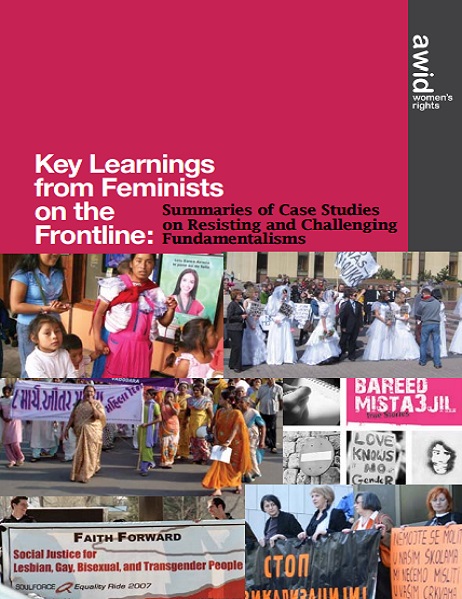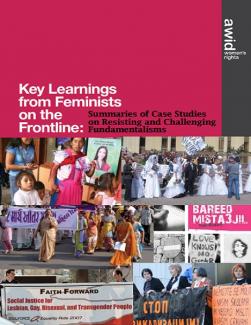
The 18 case studies, key learnings, and summaries presented here are drawn from a range of religious and geographical contexts, and cover various fields of activism related to challenging fundamentalisms. We hope that this collection will inspire, inform and encourage discussion and debate.
In 2008 AWID launched a call for proposals to document the strategies of women's rights activists confronting religious fundamentalisms. The final 18 case studies presented here are drawn from a wide range of religious and geographical contexts, and cover various fields of activism. We hope that this collection will inspire, inform and encourage discussion and debate.
This collection of case studies is a testament to the women and men around the world who have stood up to reject the imposition of norms and values in the name of religion as well as to expose and challenge the privileged position given to religion in public policies.
Rural Feminist Activism and Religious Fundamentalism in Nova Scotia, Canada
By Leona English, Lucille Harper, and Betsy MacDonald
The Antigonish Women's Resource Centre in Nova Scotia, Canada provides resources and programs to youth, including the Rural Youth Healthy Relationships Education project and the Healthy Relationships for Youth program. This case study documents the strategies used by the center and its community allies to deal with the active resistance to these programs from local school board members.
Christian Fundamentalisms and Women’s Rights in the African Context: Mapping the Terrain
By Jessica Horn
This case study explores the dynamics of Christian fundamentalism in sub-Saharan Africa and the impacts of fundamentalist doctrine, advocacy and mobilization on women’s rights in the region. It focuses on fundamentalisms in Pentecostal and charismatic Christianity, as well as fundamentalist actors in mainline Protestant churches.
Arab Queer Women and Transgenders Confronting Diverse Religious Fundamentalisms: The Case of Meem in Lebanon
By Nadine M.
This case study presents Meem, a support community for lesbian, bisexual, queer and questioning women, and transgendered people in Lebanon maps out the strategies used by Meem to challenge religious fundamentalist oppression of alternative sexualities and gender identities in Lebanon.
Sexuality, Gender and the Religious Right Case Study: Youth Advocacy on LGBT Rights in the United States
By Haven Herrin
Soulforce Q is a national civil rights and social justice organization based in the United States. It is committed to teaching and applying principles of non-violence to end discrimination based on sexual orientation and gender identity. This case study presents the philosophy, strategies, and activities of Soulforce Q, specifically highlighting the Equality Ride program.
Religious Fundamentalisms and Communalism: The Case of Sahiyar
By Trupti Shah
Sahiyar, based in Gujarat, is part of India’s autonomous women’s movement and campaigns on issues that include domestic violence, personal laws, sexual harassment, dowry, sex-selective abortion, and sexual violence. Sahiyar seeks to build a common front for human rights and communal harmony with other progressive forces in Gujarat. The case study reveals how women involved in this organization are resisting Hindu and Muslim fundamentalisms, and communalist forces.
Religious Fundamentalisms and Student Life: A View from Indonesia
By Nathanael G. Sumaktoyo and Yuyun Rindiastuti
This case study provides the context and a brief history of Islamic student organizations and movements in Indonesia, specifically the Partai Keadilan Sejahtera (PKS). The PKS is a modern and inclusive Islamic party focusing on prosperity and justice, and presents its youth leaders as agents of change.
Associazione Luca Coscioni and the World Congress for Freedom of Scientific Research Case Study: An Italian Experience of Resisting Religious Fundamentalisms
By Carmen Sorrentino, Luca Coscioni Association
This case study presents the work of The Luca Coscioni Association for Freedom of Scientific Research (ALC) in Italy, which focuses on ensuring the self determination of women related to issues including family planning, contraception, and assisted reproduction. A fuller understanding of the relationship between the freedom of scientific research, women's rights, and religious fundamentalisms is revealed in this analysis.
Confronting Catholic Fundamentalisms in the Former Soviet Union: The Case of Lithuania
By Virginija Aleksejūnė, Margarita Jankauskaitė and Vilana Pilinkaitė-Sotirovič
The Center for Equality Advancement (CEA) in Lithuania works to intervene in parliamentary debates and to challenge the Family Policy Concept bill, which openly discriminates against single mothers and non-traditional families. The center’s efforts to provide an alternative to fundamentalist politics are the focus of this case study.
Challenging the Growing Power of the Serbian Orthodox Church in Public Life: The Case of Women in Black-Serbia
By Staša Zajović and Katie Mahuron
The Women in Black is an international organisation committed to peace based on justice, and is actively opposed to war, militarism and other forms of violence. This case study presents the strategies and activities of Women in Black in Serbia who are challenging the growing power of the Serbian Orthodox Church in public life.
Stones Aimed at Us: An Overview of the Discourse and Strategies of the Stop Stoning Forever Campaign
By Shadi Sadr
Religious fundamentalism in Iran is used by the government to control women’s bodies, leading to control over their daily lives. This case study presents The Stop Stoning Forever Campaign and the strategies used to eliminate the stoning provisions from the Islamic Penal Code of Iran.
The Death of Ana Maria Acevedo: Rallying Cry for the Women's Movement
By Lucila Puyol and Paula Condrac, with Mirtha Manzur, Multisectoral Women's Group of Santa Fe
The Multisectorial de Mujeres de Santa Fe in Argentina is a feminist collective that focuses on advocacy for women’s human rights in Santa Fe Province, Argentina. In 2007, the collective sought to expose what had been done to Ana María Acevedo, a young woman who was denied cancer treatment because she was pregnant, and to bring the doctors involved to justice. The case study analyses the legal and political strategies employed by the Multisectorial both in their search for justice for Ana María Acevedo and in the fight to legalize abortion in Argentina.
Religious and Political Fundamentalisms as a Threat to Women's Rights: Challenges in the Legislature in Brazil
By Kauara Rodrigues, Juliano Alessander, Natalia Mori and Soraya Fleischer, CFEMEA - Feminist Centre for Studies and Advisory Services
El Centro Feminista de Estudos e Assessoria (CFEMEA) in Brazil works to ensure that bill 1135/1991 is not defeated or removed from the parliament’s agenda. If passed, the bill would decriminalize abortion and prevent the prosecution of approximately 1500 women who had abortions at a clinic in Campo Grande, Mato Grosso do Sul.
Challenging Religious Fundamentalisms in Bolivia: The Inclusion of Sexual and Reproductive Rights in the Constitution
By Teresa Lanza Monje, Catholics for the Right to Decide-Bolivia
The history of the relationship between state and church in Bolivia and the process that brought about the inclusion of sexual and reproductive rights in Bolivia's new constitution is described by Católicas por el Derecho a Decidir-Bolivia (CDD-Bolivia). This case study highlights how feminists inserted themselves in the process of re-crafting Bolivian institutions and used this historic moment to place limits on the negative influence of the Catholic Church on public policies affecting health and sexual reproductive rights.
An Overview of Fundamentalist Groups in Peru
By Jaris Mujica and Mauricio Rivera, PROMSEX -Centre for the Promotion and Defence of Sexual and Reproductive Rights
The Centre for the Promotion and Defence of Sexual and Reproductive Rights (PROMSEX) in Peru advocates for sexual and reproductive rights and works towards a society free of all types of discrimination and violence, and rights guaranteed for women and men. In this case study, PROMSEX presents its understanding of the concept of religious fundamentalism, a summary of the main activities of fundamentalist groups in Peru and describes the strategies used by PROMSEX to counter fundamentalisms.
Religious Fundamentalisms and the Therapeutic Abortion Protocol in Arequipa, Peru
By Ydalid Rojas Salinas, Arequipa Regional Forum for Sexual and Reproductive Rights
El Foro is a network of groups, organizations, and independent professionals that advocate for women’s rights in Peru. Its main objective is to advocate for public policies supporting the sexual and reproductive freedoms of women in Peru’s Arequipa Department. Focusing on the work of El Foro, the author presents the process leading to the approval and subsequent nullification of a therapeutic abortion care protocol in 2007, an analysis of the strategies used both by fundamentalists and the feminist coalition, as well as reflections and proposals for the future.
Mass Prosecution for Abortion: Violation of the Reproductive Rights of Women in Mato Grosso do Sul, Brazil
By Carmen Hein de Campos, Themis Legal and Gender Studies Advisory
Themis is a non-governmental feminist legal organization based in Porto Alegre, Brazil. It advocates for the rights of women, and belongs to a network of feminist organizations working to decriminalize abortion in Brazil.
Challenging Religious Fundamentalisms in Mexico: The Separation of Church and State and Reaffirmation of Women's Sexual and Reproductive Rights
By Elizabeth Placido, Catholics for the Right to Decide-Mexico
Catholics for the Right to Decide (CCD) in Mexico resists Catholic fundamentalism by insisting the government guarantees the separation of church and state. This case study examines how the CCD has worked toward reforming the constitution to more explicitly define secularism in Mexico, their efforts to lobby and raise the awareness of legislators and the effects of these efforts on legislators’ preliminary approval of the proposed reforms.
Religious Fundamentalisms in Indigenous Contexts in Chiapas and the Violation of Women's Rights
By Guadalupe Elizalde Molina and Martha Guadalupe Figueroa Mier, edited by Luz Maceira Ochoa, COLEM - Women's Collective of San Cristobal de las Casas
This case study presents two cases involving Tzeltal women in indigenous communities in Chiapas, South-eastern Mexico. The ways religious fundamentalisms responded to their situations and impact on these women's lives has many similarities. This case study examines the discrimination and injustices faced by both women when they and their families attempted to seek justice.
